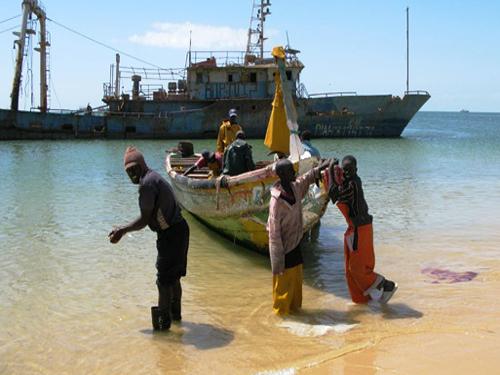Exploitation of African seas and fisheries: time to stop turning a blind eye – By Bob Dewar


Interests of the poor coastal communities and the fishermen with smaller boats and less damaging gear are usually overlooked
The history of Europe’s fishing agreements with African and other developing countries has been chequered. In late 2011, there were 9 current and 5 dormant African fish protection acts (FPAs). The first phase ended in 2002 when it was acknowledged that the “˜pay, fish and go’ approach had to convert to “˜partnership agreements’. But the next phase also came up short, not least because these agreements weren’t integrated into food security or anti-poverty planning.
So the 2012 reform of the Common Fisheries Policy, with stated objectives to bring (over)fished stocks to sustainable levels in order to benefit EU citizens and stewardship of the seas, is a welcome opportunity to do better. The Europeans need real reform in their own back yard – dramatically rebuilding stocks, preventing over-capacity, over-fishing and damage to the environment. And the mirror of better behaviour should then be shone abroad, so that African and other developing countries get maximum benefit. The Africans, in turn, need to think through how new “˜Sustainable Fisheries Agreements’ (the new name given to EU fisheries agreements with developing countries, emphasizing “˜partnership, development and sustainable fisheries’) can help bring better governance, food security and poverty reduction.
A big challenge in today’s economic context is converting good intentions into practice. Vested interests want “˜business as usual’. Thinking longer term- vital if fish stocks are to regain health – can seem a political luxury. Scientific data is sometimes mysteriously lacking and compliance weak. Meanwhile, it’s the interests of the poor coastal communities and the fishermen with smaller boats and less damaging gear which are usually overlooked.
Why do many of us in Europe and Africa forget the sea when thinking about conservation and food security? It’s not as if we do not read reports about disastrous drops in fish stocks of some species from over fishing, with all the consequences for national economies and jobs; about the drop in catches and average size of fish caught; about unmonitored factory ships, damaging gear and illegal fishing; about the “˜discards’ nonsense; or about how lack of fish has fuelled emigration and poverty along some African coasts.
Why then the blind eye? Perhaps the high seas are part of the tragedy of the commons, merely someone else’s problem?
We have inter-generational responsibilities, so what would European and African children want, if we asked them? I suspect they’d want both good conservation and healthy fish stocks. Win-win.
A combination of conservation policies and fisheries management tools does exist that might achieve that.
For Europeans this is an opportunity to walk the talk. To implement full transparency; have an eco-system approach; be science-based; and fit the precautionary principle (don’t fish where a surplus is not proved). It’s an opportunity to aim for food security by reviving healthy stocks, by moving on from the weaker management tools (eg quotas) to a toolkit incorporating the stronger measures like no-take reserves, seasonal closed areas, banning or restricting damaging gear and limiting days at sea. Fishing agreements should also be integrated into development policy – after all they are about food and nutrition.
For African partners this is an opportunity to ensure transparent and good use of fishing revenue, building domestic capacity and access for national fleets; and keeping healthy seas for artisanal and small scale fisheries, deploying a range of measures to help such communities including aquaculture.
Of course this isn’t just an issue for Europe and Africa. West Africa used to have some of the world’s richest fishing grounds, but Asian, as well as European fleets, have taken their toll over the decades. There are some similar worries off the coast of the Indian Ocean side of the continent too.
There needs to be a planetary level playing field and that’s where Regional Fisheries Management Organisations (RFMOs) come in. A genuinely reformed CFP and better EU agreements with Africa might influence behaviour of other world fleets. Better international fisheries governance should surely benefit every country’s fisheries, including developing ones.
We can’t take our magnificent marine eco-systems for granted any more. Nor can we take our traditional fish suppers – fish and chips or ceebu jen- for granted. The time of turning a blind eye is over.
Bob Dewar is a former diplomat, having served as High Commissioner to Nigeria, Amb. to Ethiopia and High Commissioner to Mozambique.






[…] Exploitation of African seas and fisheries: time to stop turning a blind eye – By Bob Dewar | Afri… The history of Europe’s fishing agreements with African and other developing countries has been chequered. In late 2011, there were 9 current and 5 dormant African fish protection acts (FPAs). The first phase ended in 2002 when it was acknowledged that the ‘pay, fish and go’ approach had to convert to ‘partnership agreements’. […]
Mauritania leads the way in fisheries management in West Africa
While the sentiments and observations expressed by Bob Dewar in his contribution ‘Exploitation Of African Seas And Fisheries: Time To Stop Turning A Blind Eye’ are honest and well meaning, he seems to subscribe uncritically to the narrative promoted by some NGOs of ‘Steel Trawlers Bad, Wooden Canoes Good’.
Such a narrative won’t help West African artisanal fishermen to develop their sector into a proper inshore sector, while originally these foreign ‘steel trawlers’ pioneered the fisheries in West African waters showing their potential, it may be time of reform, though it is not a question of either or.
There are probably no European fishermen, and I am only talking here about EU flagged vessels, who would defend the Common Fisheries Policy (CFP) and such hated practices as discards etc, and this should be a reminder to those NGOs who seem to want to export CFP (half baked reformed or not) style of fisheries management to West Africa. The EU does not really offer a model of sustainable fisheries management based as it is on even more restrictive and punitive enforcement alienating all sectors of the fishing industry that are needed to cooperate to make management a success.
No one can defend the state of fisheries management in the waters off West Africa south of Mauritania, in particular off the fragile or failing states of Guineas Bissau and Conakry, Sierra Leone, Liberia, Ivory Coast and increasingly off Togo, Benin and Nigeria too, but the problem of weak or absent fisheries management and enforcement lies in the equally weak or absent state and governance structures on shore.
South of Mauritania and Senegal West African waters are a paradise or rather hell of illegal or ‘pirate’, unregulated and unreported (IUU) fishing, but while the former is a crime, the latter two are indicative of lack of proper management and enforcement.
Certainly the crime of illegal fishing is committed by fishing vessels flagged under flags of convenience operated by certain nations (Liberia for instance used to such a notorious flag of convenience in the merchant marine), but one could describe nearly the whole of West African artisanal sector as at least unregulated, and where regulated, often illegal in practice, and certainly unreported.
Again the question is not either foreign ‘steel trawlers’ or local ‘wooden canoes’, but to reform both sectors to protect stocks as these are damaged by the lack of management and enforcement applying to both sectors, with the former trying to take as much as possible and the latter equally does the same as well as being wasteful with its catches.
What is needed is a change in mindset in most West African governments, other than Mauritania and Senegal to a certain extent, to stop regarding fisheries both as a source of revenues only through selling fishing licences and as a stop valve for food security for coastal communities when harvests fail on shore.
It is not good enough to take away the foreign ‘steel trawler’ sector and leave the artisanal sector as it is in the hope it will develop in the absence of the former; instead the former should be forced in to discharging most of its catches, partly by shifting from freezing at sea to fresh chilled at sea, in the countries where the vessels hold their licences, while the artisanal sector must be transformed into a proper inshore sector by investing in proper, inshore boats, landing and processing facilities on shore, but it will mean also reducing the number of canoes, registration and regulation.
Since 2006 Mauritania, when the current fisheries treaty with the EU was renewed and which runs out this year, has been shifting its fisheries policies along above lines and will continue whether or not the treaty will be renewed.
The Mauritanian Government realises a lot still needs to be done to shift the balance from freezing and processing for export at sea to landing and processing on shore for export as well as to modernise the artisanal sector, but it will not deviate from this course with or without a new EU fisheries treaty.
And if the treaty is not renewed it is not just because Mauritania blames the EU and the EU fishing industry for failing to live up to its development promises but also because Mauritania would like to see the end of certain NGOs coming in through the Brussels backdoor to tell neo colonially Mauritanians how to mange their fisheries.
And these NGOs should realise that for all its faults the EU fishing industry is the ‘squeezed middle’ of the internationally operating fishing industry with clenched teeth to rules of the CFP, a much easier target than the non EU industry that continues to operate off Africa and elsewhere without such rules.
It would be better if the EU and its fishing fleet begin operate in a true partnership of respect with Mauritania and its West African neighbours and with genuine commitment to develop the artisanal sector into a modern inshore sector to supply West Africa with nutritious fish.
Pieter Tesch
European Director, Industrie de Peche & Representation (IPR), Nouakchott, Islamic Republic of Mauritania
[…] Dewar, Bob. “Exploitation Of African Seas And Fisheries.” African Arguments. N.p., March 29, 2012. Web. 18 Sep 2012. <https://africanarguments.org/2012/03/29/exploitation-of-african-seas-and-fisheries-time-to-stop-turni…>. […]